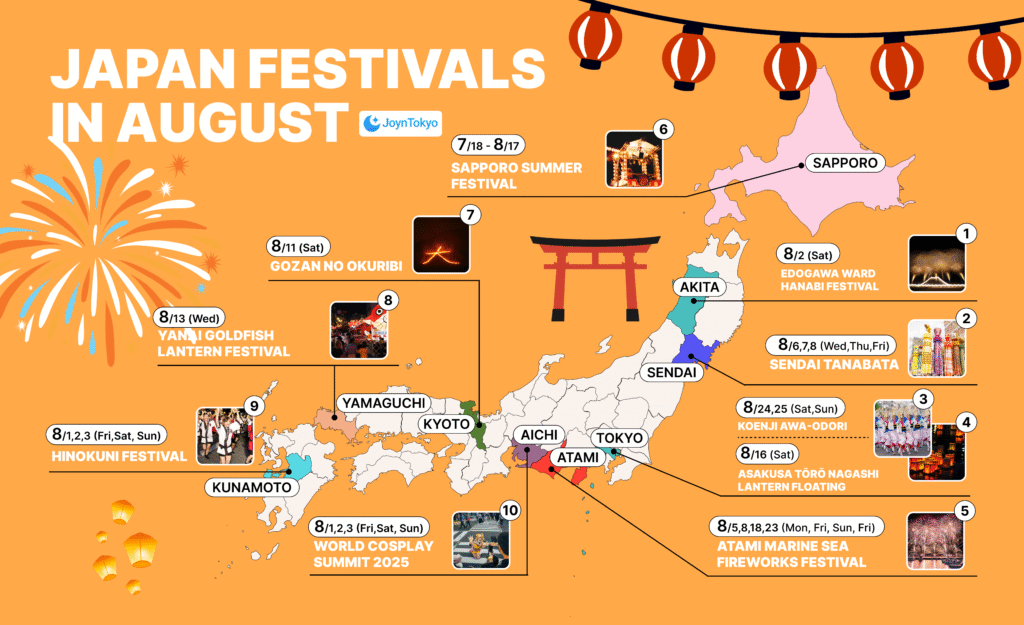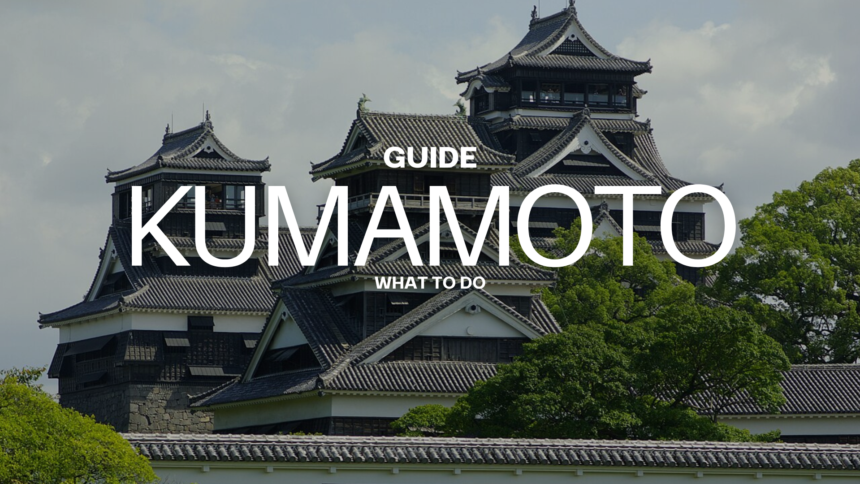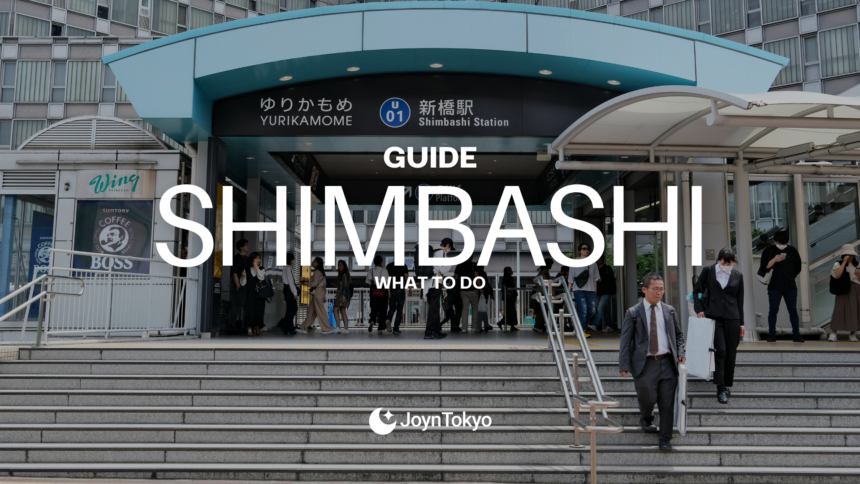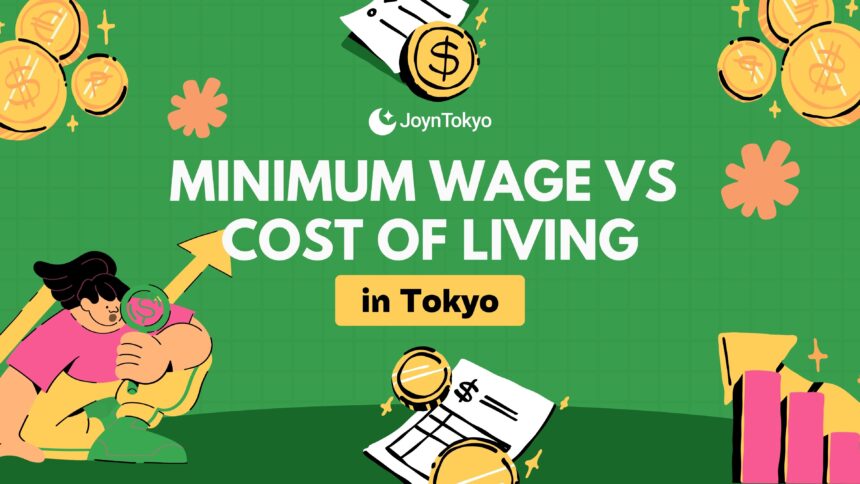From the subtropical sands of Okinawa to the crisp, wild shores of Hokkaido, Japan offers a coastal experience for every kind of beachgoer. Whether you’re looking to surf world-class waves, unwind on calm stretches of white sand, or cool off with a quick seaside escape from the city, there’s a beach waiting with your name on it. Organized by region, this guide highlights some of the most popular and unforgettable shorelines across the country—perfect for planning your next summer escape.
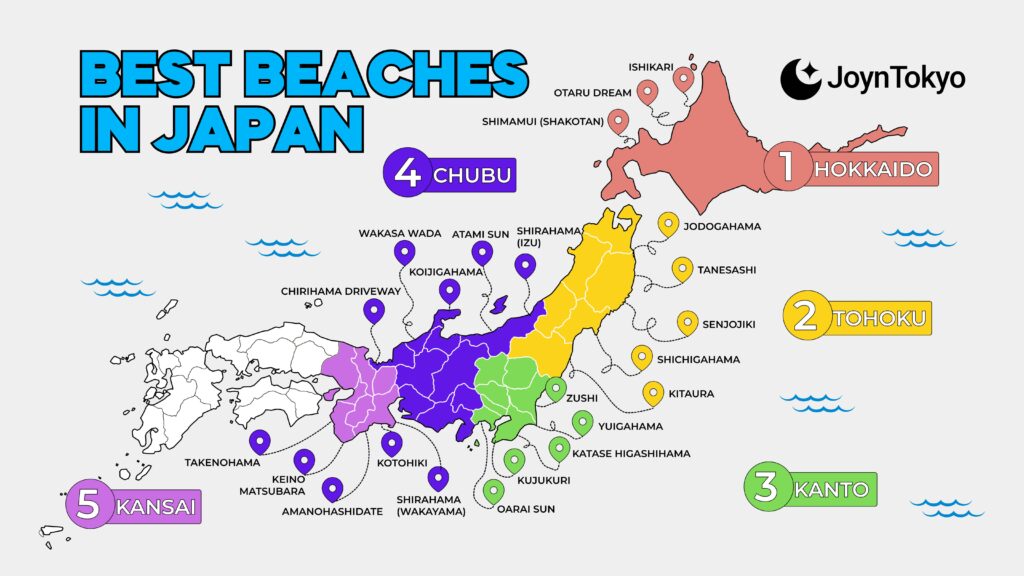
| Region | Beach | Travel Time | Typical Costs | Highlights |
|---|---|---|---|---|
| Near Tokyo | Odaiba Beach | 24 min via JR Saikyo Line onto Rinkai Line to Tokyo Teleport | Free entry, mall showers/lockers | Urban skyline views, volleyball, fireworks |
| Kamakura Beaches | 57–60 min via JR Shonan-Shinjuku Line to Kamakura Station | ¥1,500 beach hut, ¥500 locker | Surf culture, beach huts, walkable from town | |
| Enoshima Beaches | 65–85 min via Odakyu Line to Katase-Enoshima Station | ¥1,500 chair, ¥300 shower | Music, lifeguards, onsen and island views | |
| Shirahama Beach (Izu) | 2 hr 40 min–3 hr via Limited Express Odoriko to Izukyu-Shimoda | ¥2,000 umbrella, ¥4,000 surf rental | White sand, turquoise water, clifftop trails | |
| Boso Peninsula Beaches | 90–150 min via JR Sobu Rapid + Uchibo/Sotobo Line from Chiba or Soga | ¥1,000 parking, ¥1,200 chair | Surfing, family coves, Fuji views | |
| Hokkaido | Ishikari | 40 min from Sapporo (car) | ¥500 parking, ¥200 shower | Dunes, sunsets, hot springs nearby |
| Otaru Dream | 50 min from Sapporo (car) | ¥1,000 chair, ¥300 locker | Pop-up clubs, calm water | |
| Shimamui (Shakotan) | 2 hrs from Sapporo (car) | Free parking | Cliffs, snorkelling, no facilities | |
| Tohoku | Jodogahama | 2 hr 40 min train + 15 min bus from Morioka | ¥300 facilities, ¥1,400 boat | White pebbles, “blue cave”, geology trails |
| Tanesashi | 30 min bus from Hachinohe | ¥1,000 bike rental | Grasslands, tide pools, cycling | |
| Senjojiki | 2 hrs from Akita (train) | Free | Basalt slabs, dramatic sunsets | |
| Shichigahama | 50 min from Sendai | ¥700 parking, ¥1,000 chair | Rebuilt beach, beach yoga | |
| Kitaura | 1 hr 30 min from Fukushima City | ¥500 parking, ¥400 soft-serve | Black sand, lantern festivals | |
| Chubu | Shirahama (Izu) | 3 hr Limited Express from Tokyo | ¥2,000 umbrella, ¥4,000 snorkel | White sand, lava cliffs, beach bars |
| Atami Sun | 45 min Shinkansen from Tokyo | ¥1,200 chair | Night swims, frequent fireworks | |
| Koijigahama | 2 hr 30 min bus from Nagoya | ¥500 parking, ¥1,000 bike | Sunrise, lighthouse, tide pools | |
| Wakasa Wada | 2 hr 10 min from Kyoto | ¥1,500 umbrella, ¥200 shower | Blue Flag, seafood, snorkelling | |
| Chirihama Driveway | 1 hr from Kanazawa | Free access, ¥800 rake | Beach driving, van cafés | |
| Kansai | Shirahama (Wakayama) | 2 hr 20 min train from Shin-Osaka | ¥2,000 umbrella, ¥700 onsen | Fireworks, panda park, abalone grills |
| Kotohiki | 2 hr 30 min train from Kyoto | ¥1,000 parking, ¥2,000 campsite | Camping, pine groves, starry skies | |
| Amanohashidate | 2 hr train from Kyoto | ¥500 bike, ¥1,000 chair | Sandbar views, biking | |
| Keino Matsubara | 1 hr 40 min bus from Kobe | ¥700 parking, ¥600 lantern | Sunset swings, lantern festivals | |
| Takenohama | 3 hr train + taxi from Osaka | ¥3,000 SUP, ¥5,000 kayak | Caves, calm water, Wagyu BBQ |
Top 5 Beaches Near Tokyo
Tokyo may be a megacity, but its seaside escapes are surprisingly close. From urban sandbars with skyline views to island coves dotted with palm trees, the region serves up beaches for every kind of summer break. The official swimming season runs mid July through August, but warm waters often linger into September, perfect for weekday dips and off peak getaways. Trains, buses, and even ferries link the mainland with Shizuoka’s Izu Peninsula and the volcanic Izu Islands, while Chiba’s Boso coast offers reliable waves and distant glimpses of Mt Fuji.
Odaiba Beach, Tokyo Bay
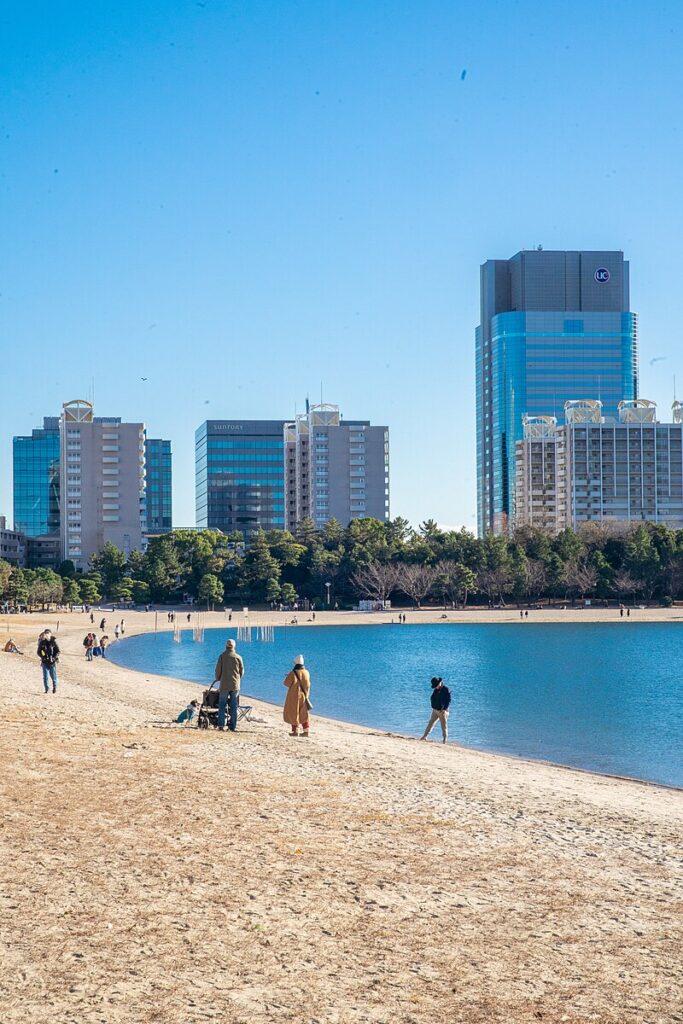
Tokyo’s most accessible beach is also its most urban; an 800‑meter man made strand framed by Rainbow Bridge and skyline towers. Swimming is prohibited, but locals sunbathe, play volleyball, and sip drinks at pop up bars with deck seating. Nightfall brings romantic skyline reflections and summer fireworks from nearby piers.
- Travel time: 24 minutes via JR Saikyo Line through service onto the Rinkai Line to Tokyo Teleport from Shinjuku Station
- Costs: free entry, lockers and showers available in nearby malls
- Google maps
Kamakura Beaches, Kanagawa
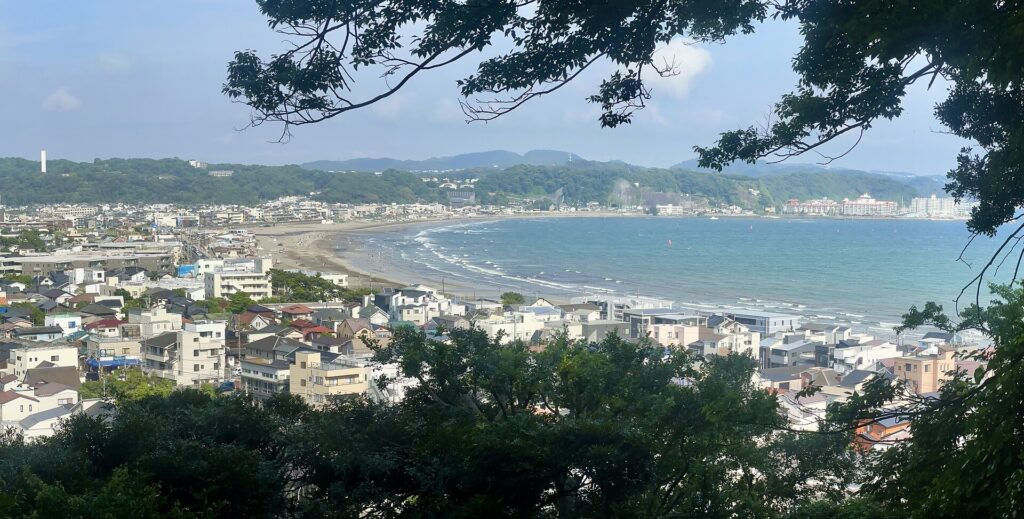
A 20 minute walk from Kamakura Station leads to a cluster of lively beaches popular for their surf and beach hut culture. Summer huts rent parasols and serve shaved ice, while DJs spin from open decks. The sand may not be white, but the mood is golden hour all day long.
- Travel time: 57–60 minutes via JR Shonan-Shinjuku Line to Kamakura Station from Shinjuku Station
- Costs: beach hut access ¥1,500, locker ¥500
- Google maps
Enoshima Beaches, Kanagawa
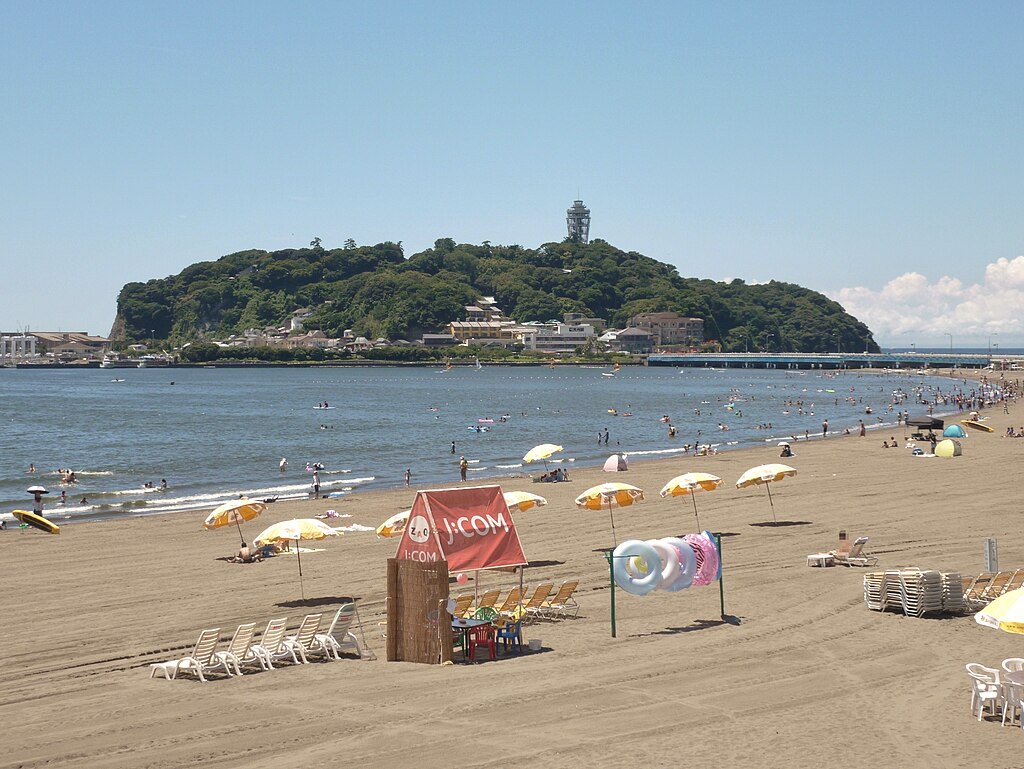
Beaches on both sides of the causeway to Enoshima Island bustle with swimmers, music, and seafood stalls in summer. Lifeguards patrol the main sections, while surfers head west for consistent waves. After swimming, climb the island for coastal views or visit the Enospa onsen to soak in style.
- Travel time: 65–85 minutes via Odakyu Line (Romancecar or Express) to Katase-Enoshima Station from Shinjuku Station
- Costs: deck chair ¥1,500, shower ¥300
- Google maps
Shirahama Beach, Izu Peninsula
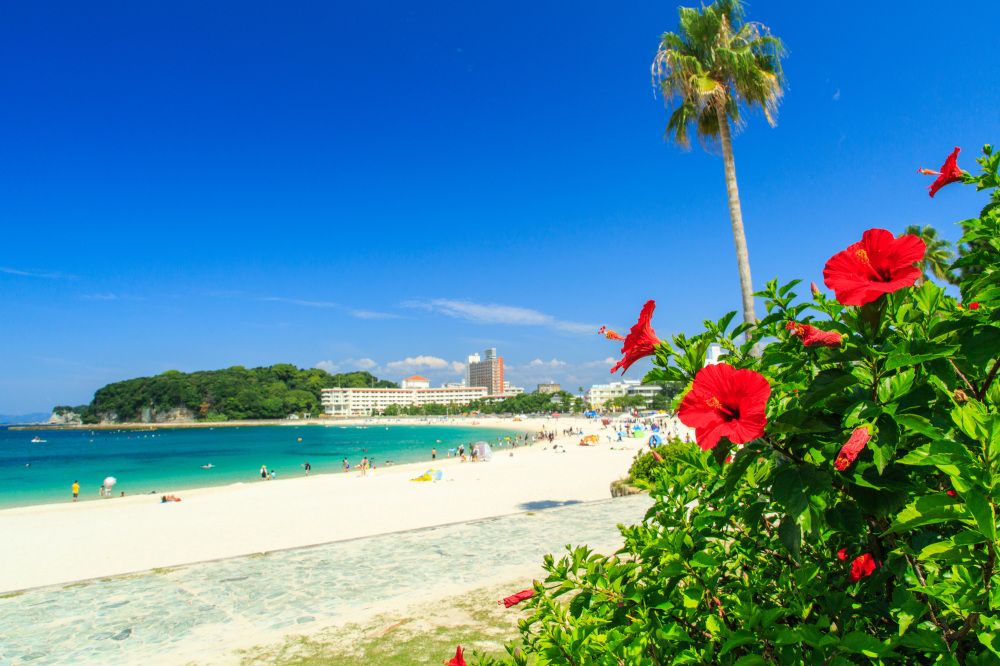
With sugar‑white sand and turquoise waters, Shirahama is Izu’s best‑known beach — and one of the most beautiful on Honshu. Facilities include changing rooms, shops, and rentals for surfboards and snorkels. Catch sunset from the clifftop trails, then dip into a nearby onsen for the perfect wind‑down.
- Travel time: 2 hr 40 min–3 hr via Limited Express Odoriko to Izukyu-Shimoda Station from Shinjuku or Tokyo Station
- Costs: umbrella ¥2,000, surf rental ¥4,000
- Google maps
Boso Peninsula Beaches, Chiba
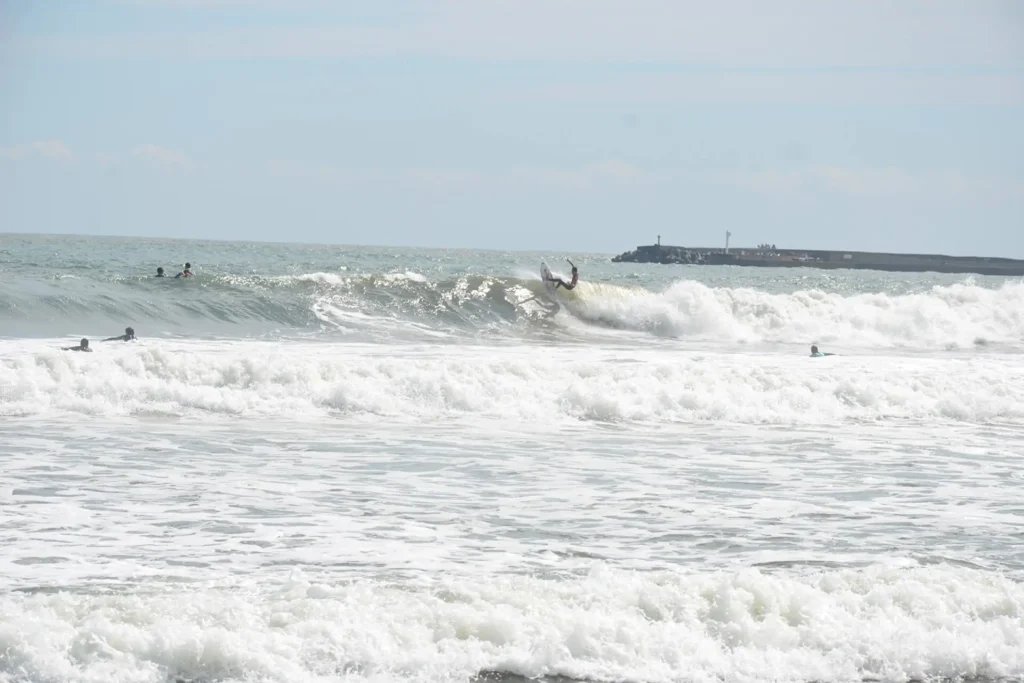
The eastern coast faces open Pacific swell, perfect for bodyboarding and surfing, while the western edge offers calm coves and Fuji views on clear days. Ichinomiya is a local surf mecca, while places like Futtsu and Tateyama cater to families. Many beaches here have long shallow entries, making them great for kids.
- Travel time: 90–150 minutes via JR Sobu Rapid Line and JR Uchibo or Sotobo Line with transfer at Chiba or Soga from Shinjuku Station
- Costs: parking ¥1,000, chair rental ¥1,200
- Google maps
Top 3 Beaches in Hokkaido
Hokkaido’s short but glorious summer lights up broad dunes and jade coves, with sunset lingering near 21:00. Water temperature hovers in the low 20°C range, so a swim feels invigorating, while a bonfire and hoodies are musts after dark.
Ishikari Beach
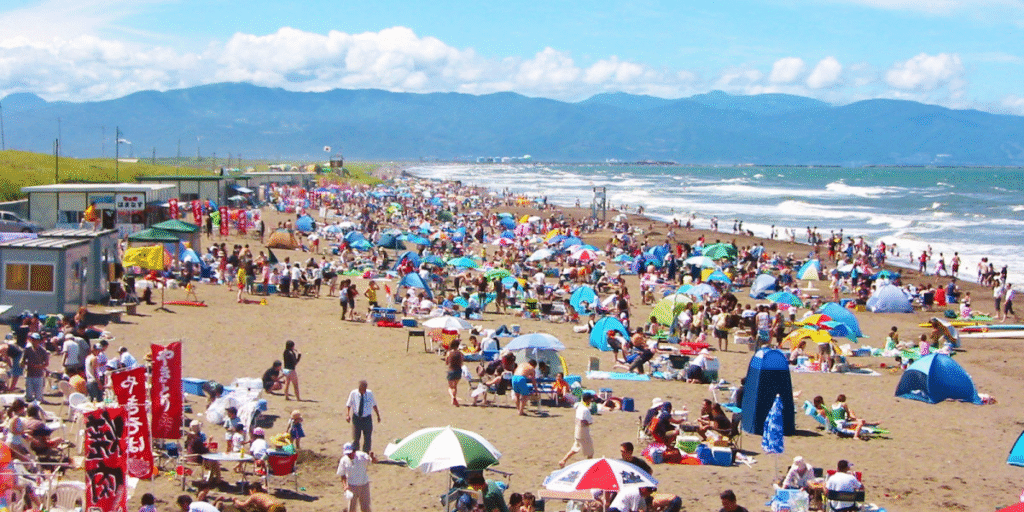
A sprawling, dune‑backed strand just northwest of Sapporo, Ishikari hosts family barbecues and evening anglers seeking flounder from the breakwater. Ospreys circle overhead, and on clear evenings the horizon glows pastel pink. Lifeguards operate for only six weeks, so heed the flagged zone. Parking is plentiful, and a hot‑spring town sits ten minutes inland.
- Travel time: 40 minutes by car from Sapporo
- Typical costs: parking ¥500, hot shower ¥200
- Google maps
Otaru Dream Beach
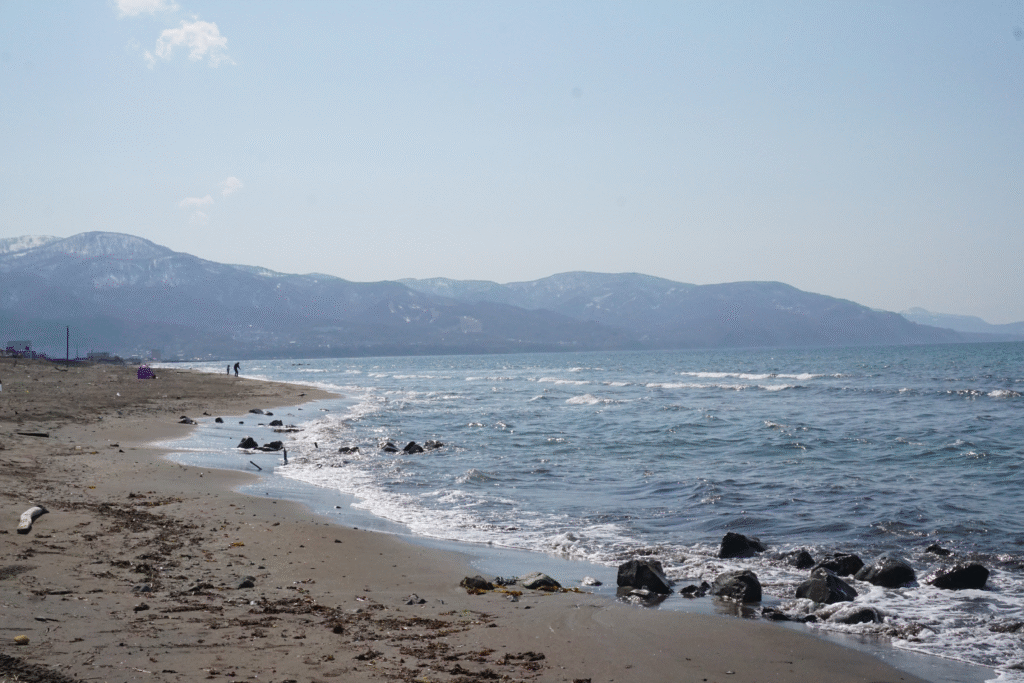
During the summer, this strip plays host to pop‑up clubs, takoyaki stalls, and neon floats. Calm water suits casual dips, though a night swim still gives a polar‑plunge thrill. Arrive mid‑week if you crave elbow room but still want live beats.
- Travel time: 50 minutes from Sapporo by car
- Typical costs: chair rental ¥1,000, locker ¥300
- Google maps
Shimamui Coast (Shakotan)
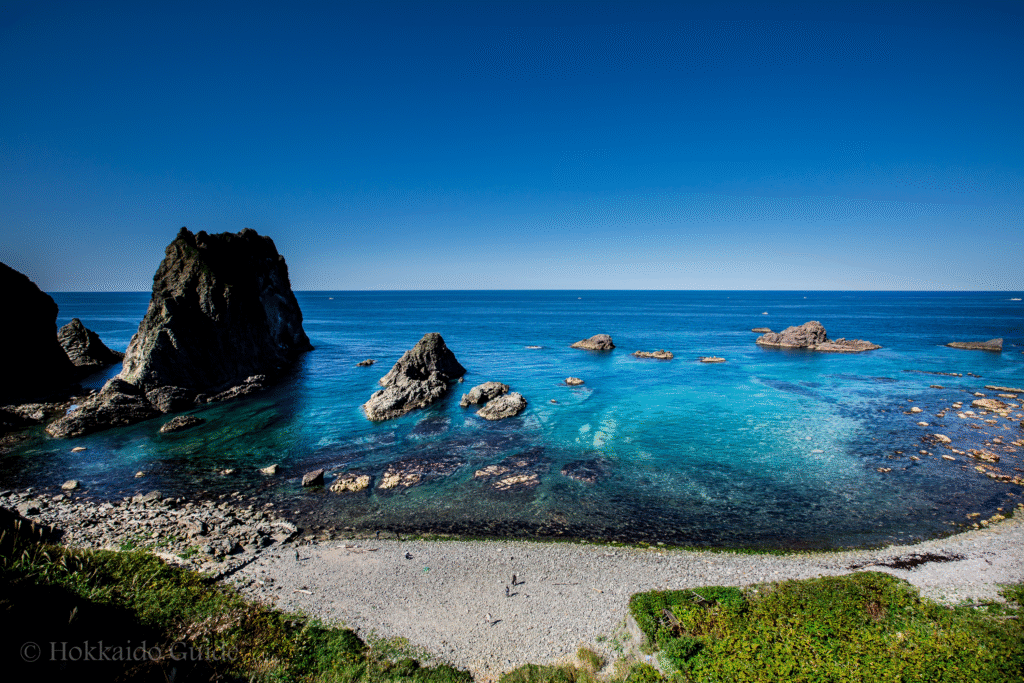
Turquoise coves meet towering basalt cliffs on this National Scenic Spot. A steep stairway ends at a pocket beach of smooth stones where snorkellers drift above waving kelp forests. Bring reef shoes and snacks: the nearest vending machine is 6km away. Sunset paints the cliff faces amber before the drive home.
- Travel time: 2 hours by car from Sapporo (limited buses)
- Typical costs: free parking
- Google maps
Top 5 Beaches in Tohoku
Rugged Pacific capes and calm Sea‑of‑Japan coves make Tohoku ideal for travelers seeking lush scenery without the crowds. New seawalls and memorial parks commemorate the 2011 tsunami, and the coastline feels powerfully reborn.
Jodogahama Beach, Iwate
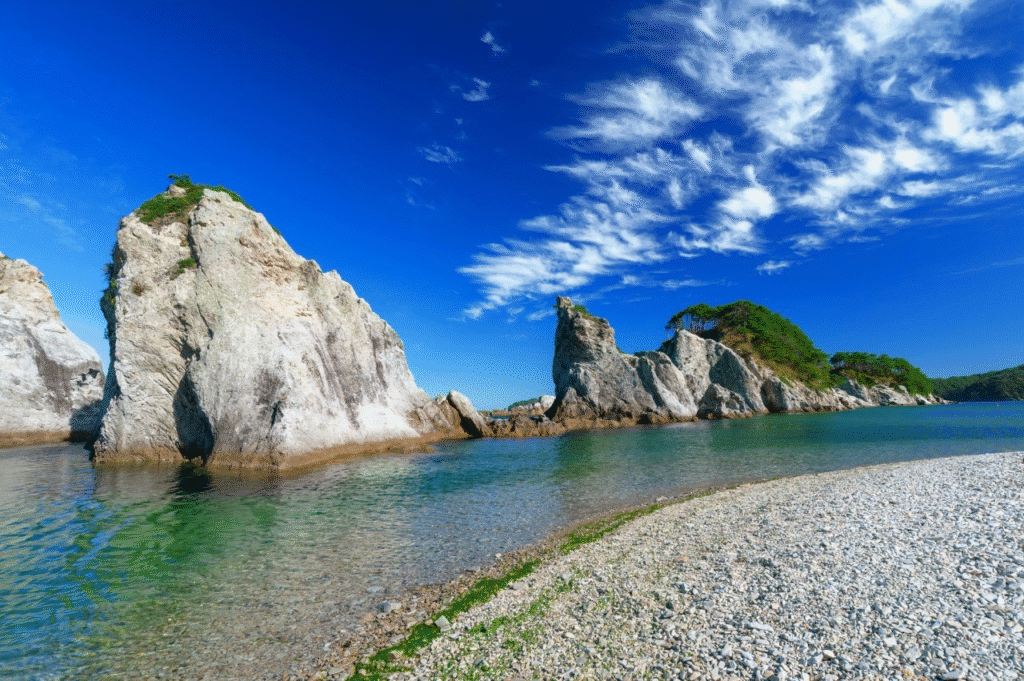
Chalk‑white pebbles and needle‑thin rock spires enclose a glassy inlet where boats glide over aquamarine shallows. There are trails that loop pine‑clad headlands, and a visitor centre explaining Sanriku geology. Families rent pedal boats, while photographers chase the famous “blue cave” glow at noon. Arrive early: parking fills fast on sunny Sundays.
- Travel time: 2 hours 40 minutes train from Morioka and a 15 minute bus
- Costs: facilities ticket ¥300, boat cruise ¥1,400
- Google maps
Tanesashi Coast, Aomori
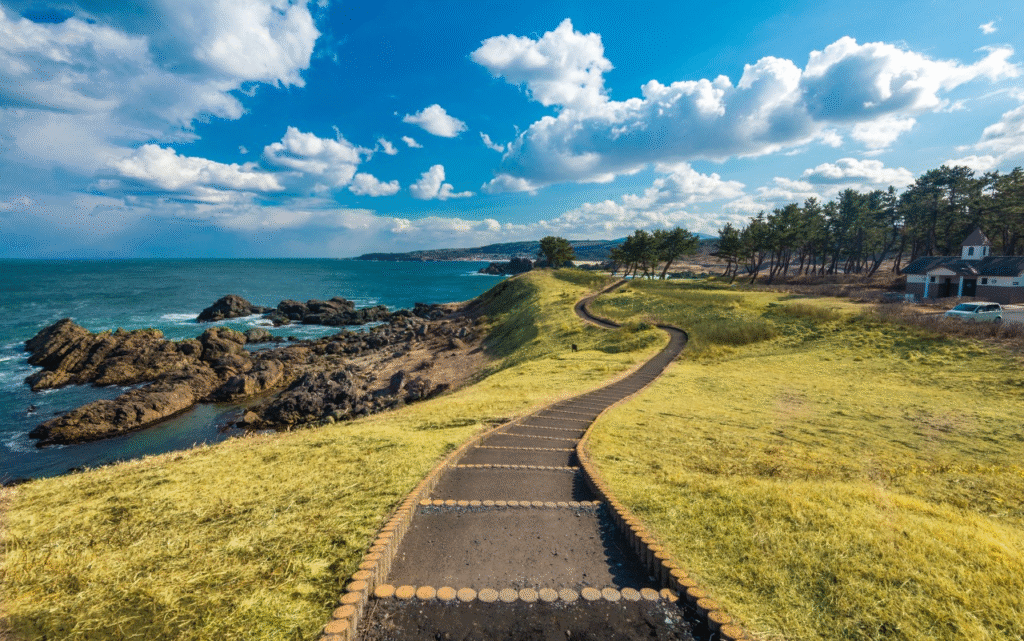
Sea‑sprayed grasslands tumble into tide pool‑studded rocks along a 12 km boardwalk. Wildflowers bloom in June through August, and locals picnic under sweeping skies. Surfers ride mellow breaks at neighboring Osuka Beach, then warm up with miso clams in seaside cafés. Cycling rentals make a car‑free day easy.
- Travel time: 30 minute bus from Hachinohe
- Costs: bike rental ¥1,000/day
- Google maps
Senjojiki Coast, Aomori
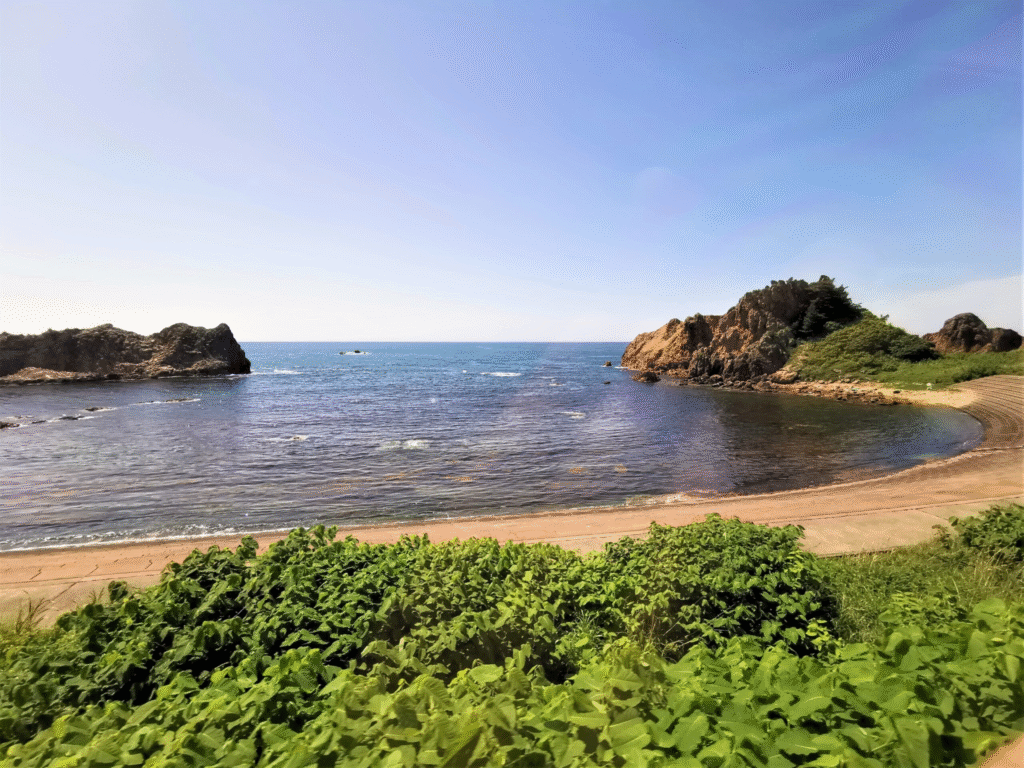
Basalt slabs are spread on the beach like natural tatami mats, their cracks home to hermit crabs and tiny starfish. The low‑tide promenade turns crimson under sunset, perfect for photography. Facilities are scant, so bring your own snacks and watch the tide chart posted at the station.
- Travel time: 2 h scenic train from Akita
- Costs: free
- Google maps
Shichigahama Beach, Miyagi
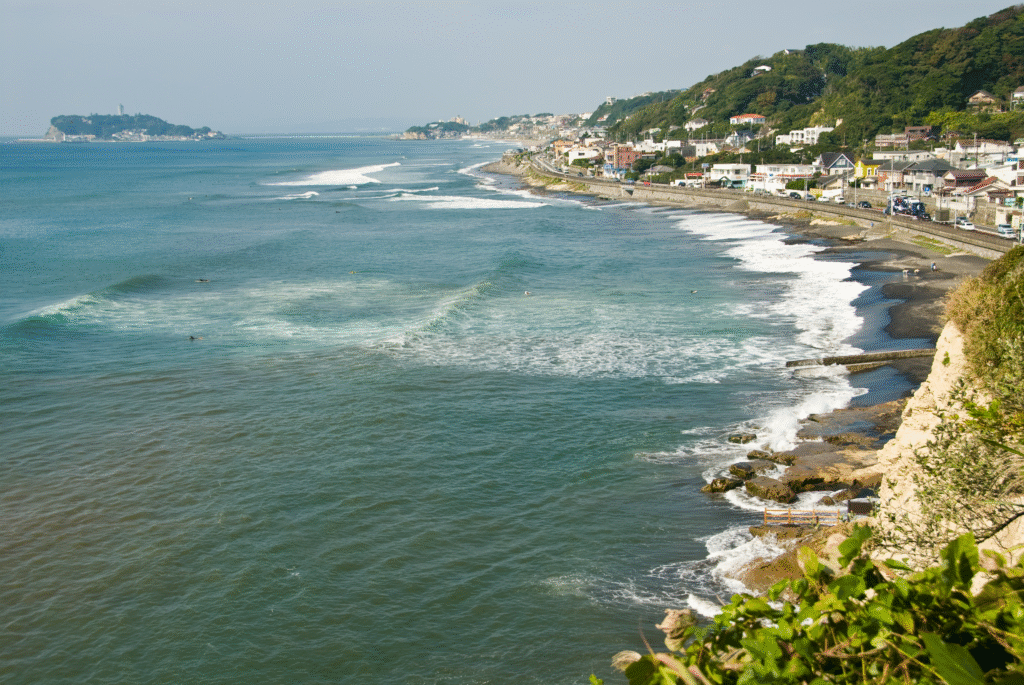
A soft‑sand crescent outside Sendai, Shichigahama was rebuilt quickly after the 2011 tsunami, and now hosts lifeguarded swims plus beach yoga at dawn. Food trucks sell zunda‑milk shakes, a regional soybean treat. Evenings feel tranquil, with locals walking dogs while fishermen cast for sea bass.
- Travel time: 50 min by car from Sendai or local bus
- Costs: parking ¥700, chair ¥1,000
- Google maps
Yotsukura Beach, Fukushima

A long beach in Iwaki, which at its peak attracted over 100,000 people a year, it could be said to be symbolic of the rebirth of the Tohoku region following the 2011 tsunami, after remaining closed for two years. It has beautiful seas for swimming, and you can rent bicycles for cycling along the coast.
- Travel time: 1 hour 30 minute by car from Fukushima City
- Costs: Free
- Google maps
Top 5 Beaches in Kanto
These coastal spots come alive in summer with bustling beach houses, grilled seafood, and rental stands offering everything from umbrellas to paddleboards. Crowds gather for swimming, surfing, and sunset views, especially on clear days when Mt Fuji appears in silhouette. Enoshima and Zushi are favorites for their convenience and atmosphere, while Kujukuri offers more space and a laid-back vibe.
Zushi Beach, Kanagawa
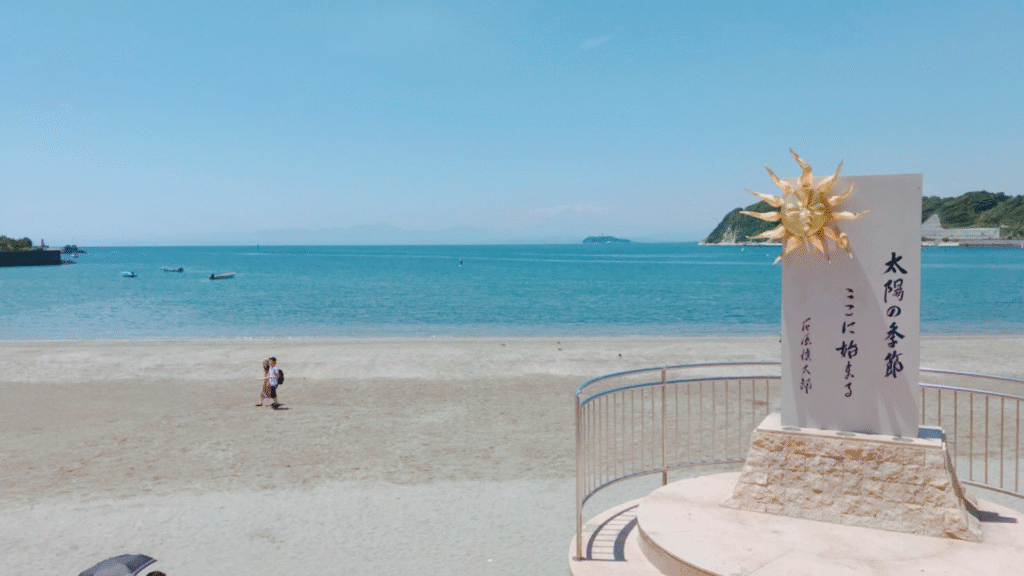
Zushi’s half‑moon bay boasts Blue Flag water, floating play parks, and paddle‑board fleets — an urbanite’s quick fix for sea air. Late sunsets cast Fuji’s outline over sailboats, turning the sand pink. Nightly tiki torches mark terrace cafés, and local bylaws keep noise modest after 20:00. Come mid‑week for extra towel space.
- Travel time: 1 hour JR Yokosuka Line from Tokyo Station
- Costs: umbrella set ¥2,000, locker ¥500
- Google maps
Yuigahama Beach, Kamakura
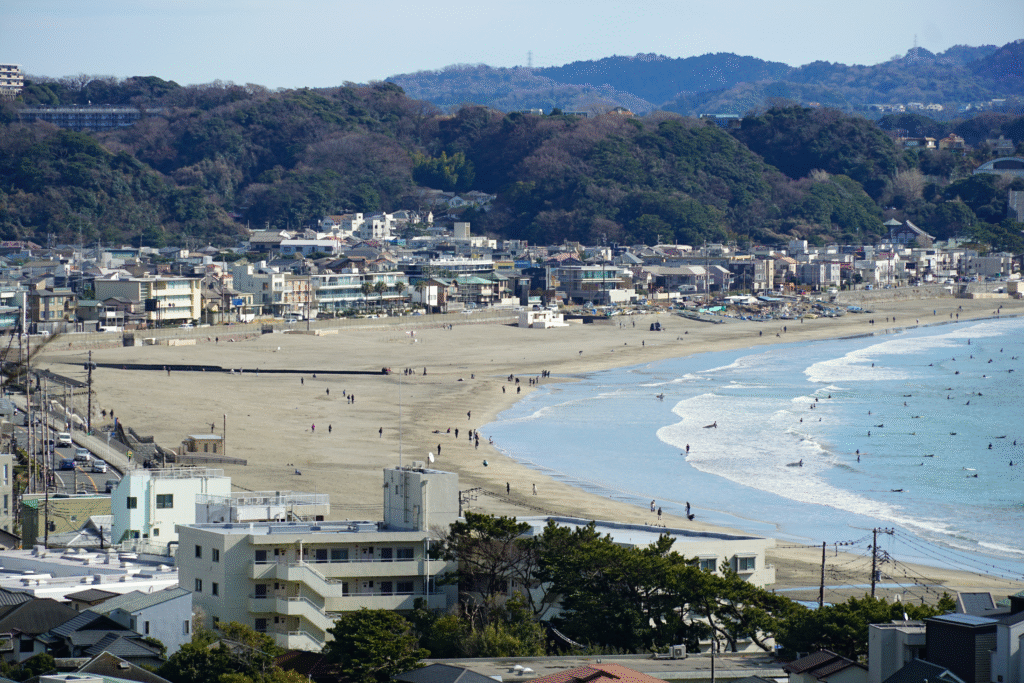
Temple bells echo faintly across mellow surf where longboard lessons start at dawn. After a dip, stroll to Hasedera Temple for hydrangeas, then refuel on shirasu‑don whitebait bowls. Evening fireworks pop small but frequent, giving Fuji a glitter border. Lockers, showers, and cafés run June–August.
- Travel time: 70 minutes via JR Yokoksuka Line and Enoden Line
- Costs: surf lesson ¥5,000, locker ¥500
- Google maps
Katase Higashihama, Enoshima
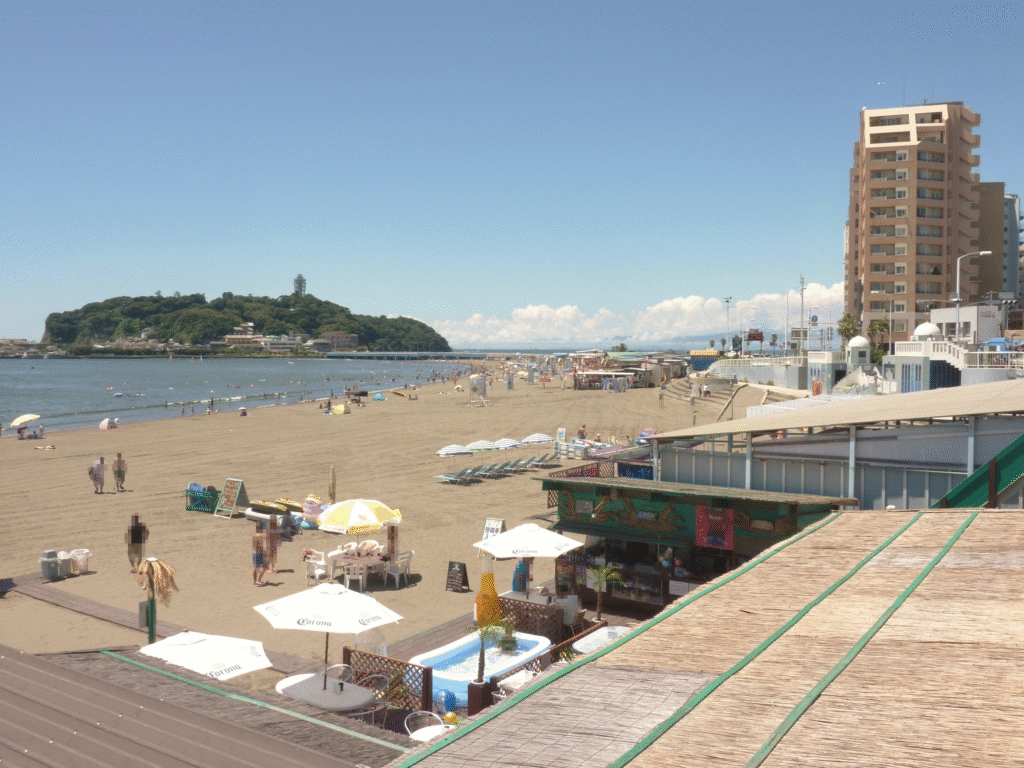
Katase Higashihama has been nicknamed by some “the Miami of the Orient” thanks to the laid-back and fun-loving visitors. Windsurfing is especially popular here Climb Enoshima’s lighthouse for panoramic twilight shots, then soak in the nearby Enospa onsen.
- Travel time: 65 minutes via Odakyu Line from Shinjuku
- Costs: beach‑house entry ¥1,000, board ¥4,000
- Google maps
Kujukuri Beach, Chiba
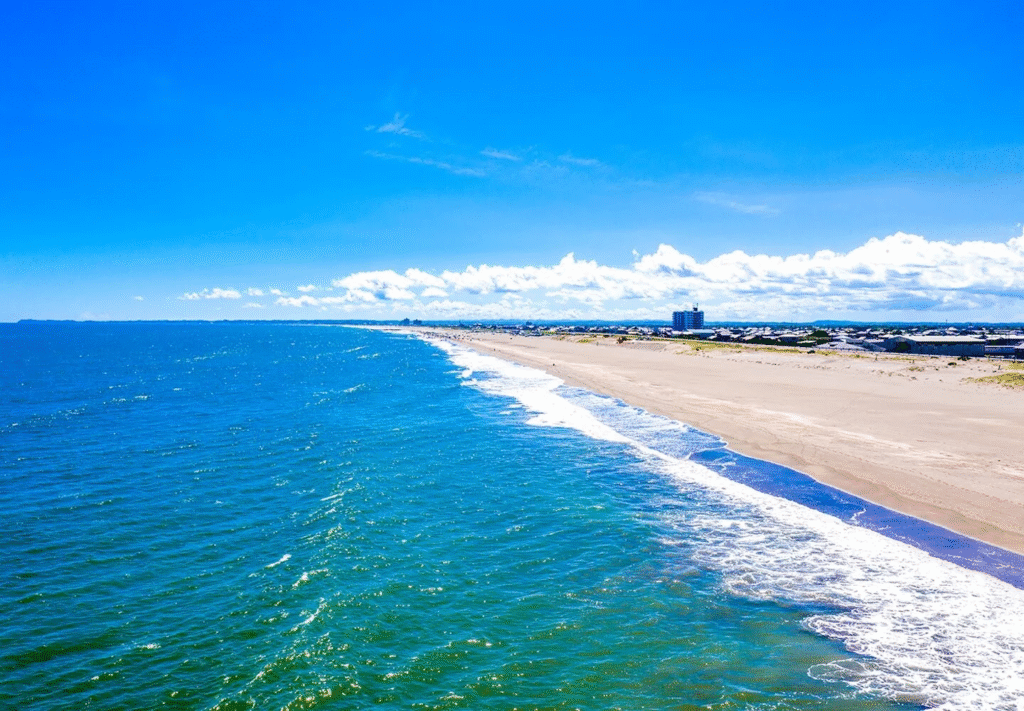
Sixty kilometers of open face sandbars provide consistent surf and endless jogging lanes. Early birds watch fishermen haul sardines with sunrise nets. Later, kite‑surfers trace arcs against cobalt sky. Ichinomiya’s Olympic break peaks on typhoon swells, but beginners can find mellow waves southward.
- Travel time: 90 minutes car or express bus from Tokyo Station
- Costs: parking ¥1,000, shower ¥300
- Google maps
Oarai Sun Beach, Ibaraki
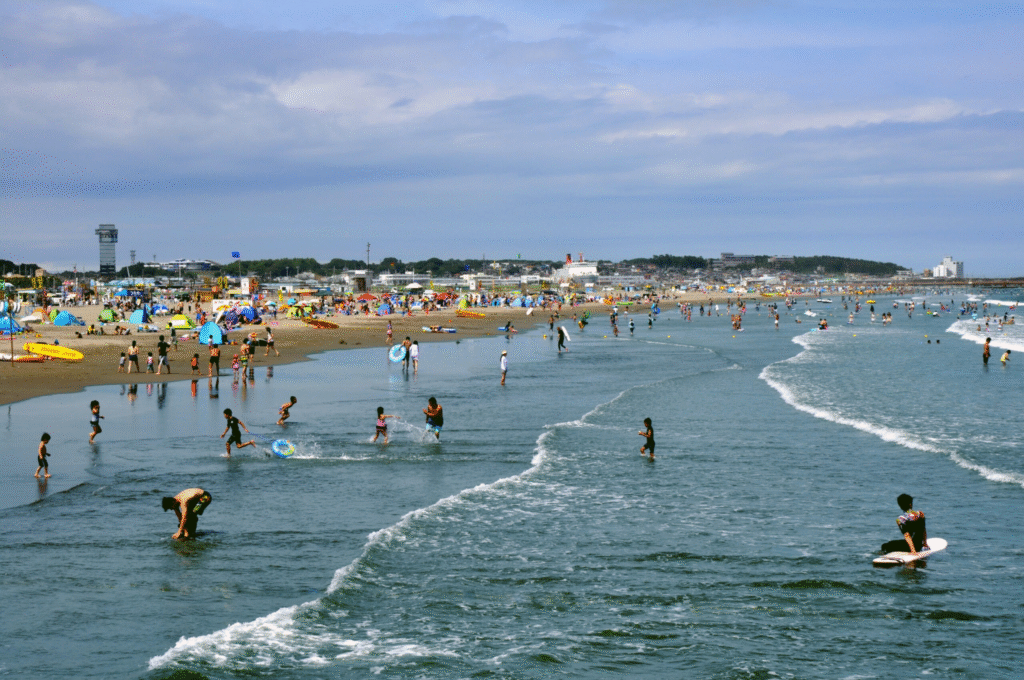
Wheelchair‑friendly boardwalks, volleyball courts, and shallow tidal shelves make this Kanto’s most inclusive family strand. A torii gate standing in crashing surf at nearby Oarai Isosaki Shrine supplies Instagram‑fodder. Highway buses run direct from Tokyo, and the seafood road stalls grill clams to order.
- Travel time: 1 hour 55 minute by highway bus from Tokyo Station
- Costs: parking ¥1,500, umbrella ¥1,800
- Google maps
Top 5 Beaches in Chubu
From the rugged coves of Izu to the calm, glass-green shores of the Sea of Japan, Chubu offers beaches with dramatic scenery and crystal-clear waters. Many spots pair sea views with nearby mountains, creating a uniquely scenic coastline. Onsen towns like Atami and seafood stalls along the shore add local flavor to any beach trip.
Shirahama Beach, Izu
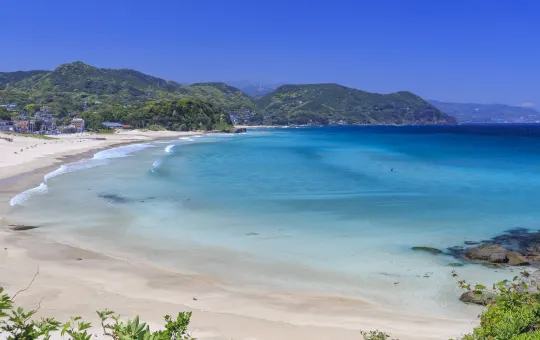
Caribbean‑blue water meets sugar‑white sand framed by black‑lava cliffs. Express trains drop visitors steps from the shore, and nearby snorkel tours reveal neon damselfish. After sunset, beach bars host acoustic sets beneath paper lanterns, and cliff‑top hot springs simmer under stars.
- Travel time: 3 hour Limited Express Odoriko from Tokyo Station
- Costs: umbrella ¥2,000, snorkel tour ¥4,000
- Google maps
Atami Sun Beach
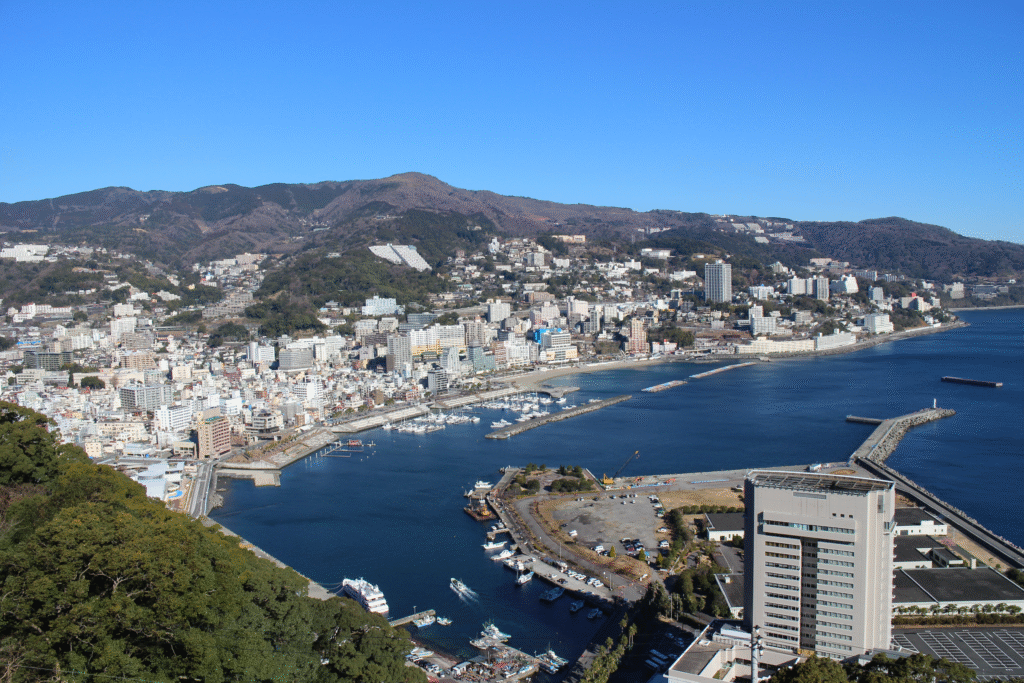
A palm‑lined boardwalk glows under LED floodlights until midnight, enabling romantic night swims. July/August fireworks explode over the bay nearly every weekend. Quick bullet‑train access makes spur‑of‑the‑moment trips possible, and steaming onsen baths are no more than a walk away.
- Travel time: 45 minutes Shinkansen from Tokyo Station
- Costs: deck chair ¥1,200, fireworks free
- Google maps
Koijigahama, Aichi
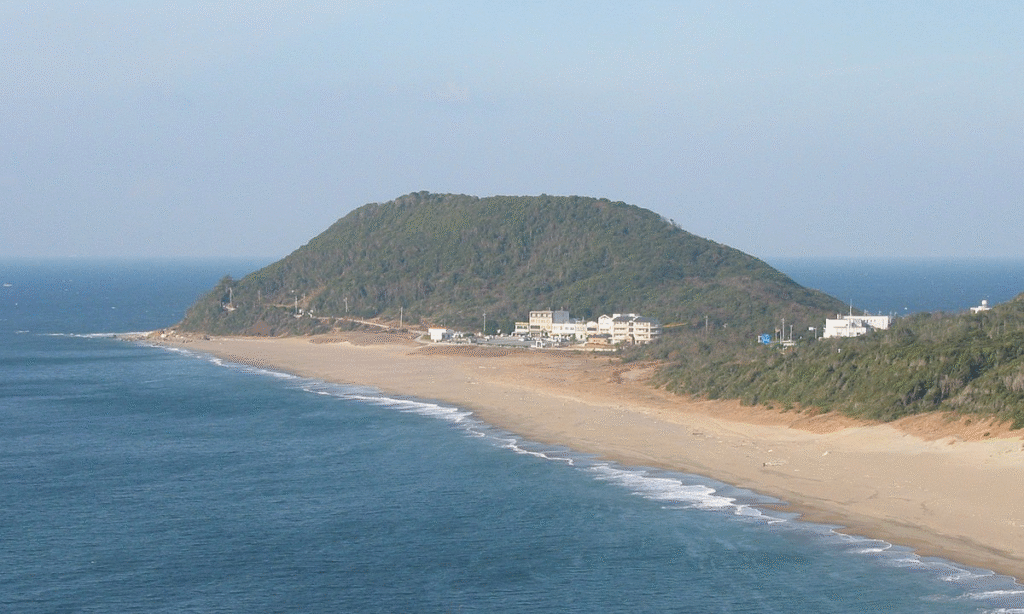
Golden sand curls beside Cape Irago, where the Pacific collides with Ise Bay. Sunrise paints the lighthouse radiant orange, and cyclists pedal the scenic coastal loop. Tide pools shelter hermit crabs, while quiet dunes invite sunrise yoga.
- Travel time: 2 hour 30 minute bus from Nagoya
- Costs: parking ¥500, bike ¥1,000
- Google maps
Wakasa Wada, Fukui
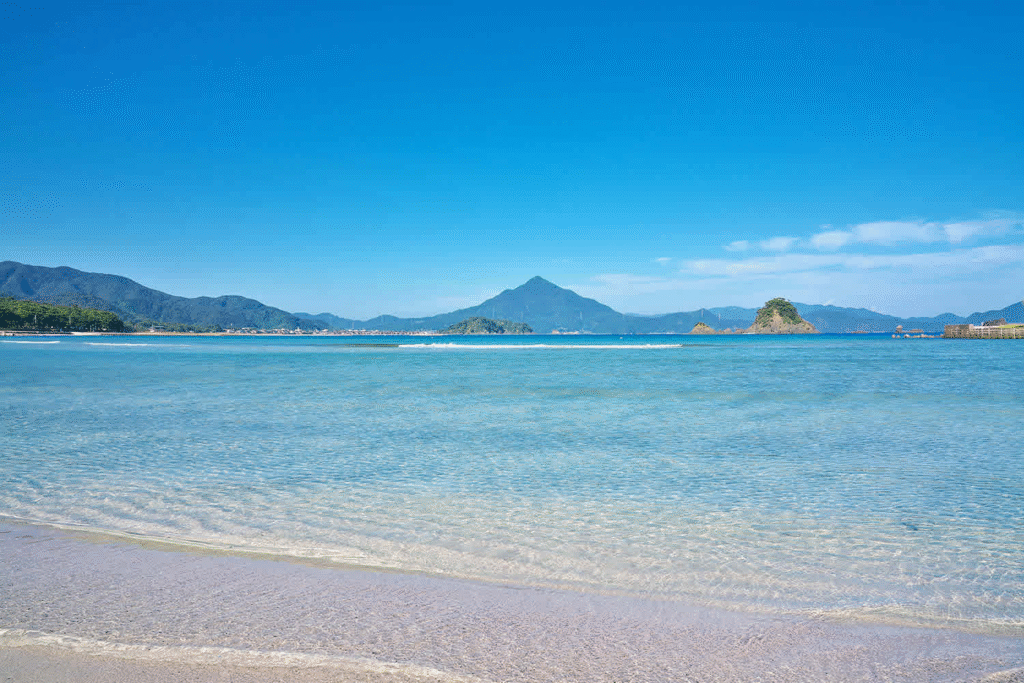
Clear shallows and mountain silhouettes earned Wakasa Wada Japan’s first mainland Blue Flag. Local inns rent snorkel sets for seagrass beds hiding octopus, and evenings end with grilled saba mackerel on seaside tatami decks.
- Travel time: 2 h 10 min Limited Express Thunderbird train and JR Obama Line from Kyoto
- Costs: umbrella ¥1,500, shower ¥200
- Google maps
Chirihama Nagisa Driveway, Ishikawa
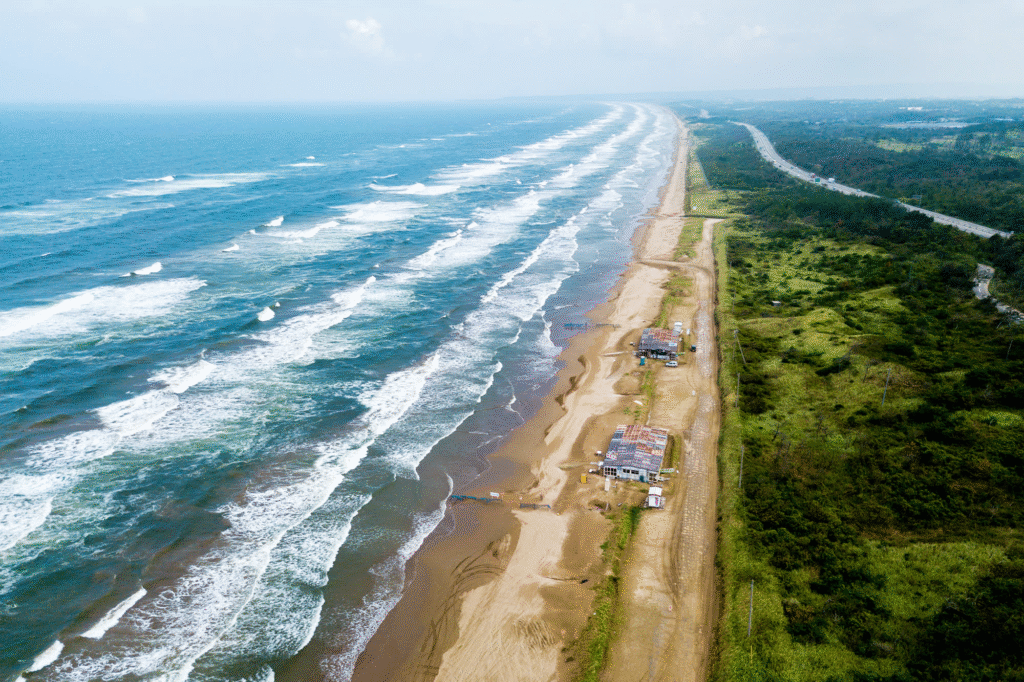
Japan’s only beach open to cars to drive on, Chirihama’s hard packed sand packs is solid enough to drive an eight‑kilometer stretch along the Sea of Japan. Motorcycles and classic cars cruise during sunset in a parade-like fashion. Stop anywhere for razor‑clam digging or beach coffee brewed from van cafés.
- Travel time: 1 hour car drive from Kanazawa
- Costs: free drive access, clam rake rental ¥800
- Google maps
Top 5 Beaches in Kansai
Kansai’s coastline ranges from the lively resort beaches of Wakayama to the quiet, pine-lined shores of the Tango Peninsula. South of Osaka, spots like Shirahama draw summer crowds with fireworks, festivals, and hot springs. Further north, Kyoto’s seaside offers calm coves and cooler waters ideal for a slower pace. Whether you’re chasing a party or a peaceful swim, Kansai delivers both.
Shirahama Beach, Wakayama
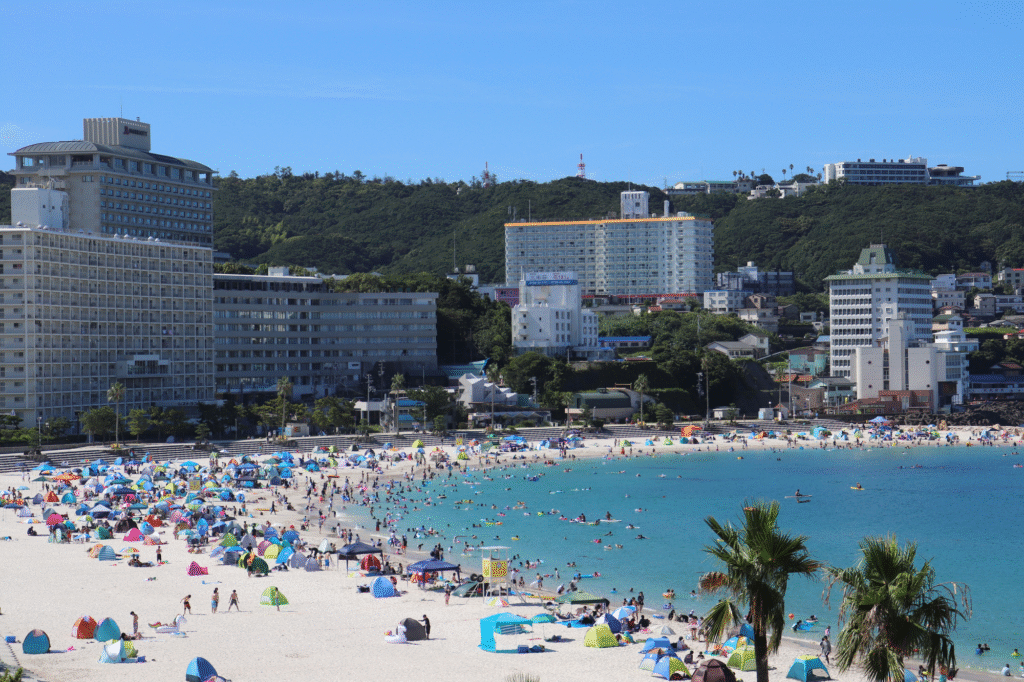
Resort towers overlook pure white sand imported from Australia after erosion in the 20th century, and steamy cliff‑top onsen pools enjoy ocean views. Nightly fireworks run July–September, while Adventure World’s pandas draw day‑trippers. Restaurants grill freshly speared abalone right on the promenade.
- Travel time: 2 hour 20 minute Limited Express Kuroshio train from Shin-Osaka Station.
- Costs: umbrella ¥2,000, onsen ¥700
- Google maps
Kotohikihama, Kyoto (Tango)
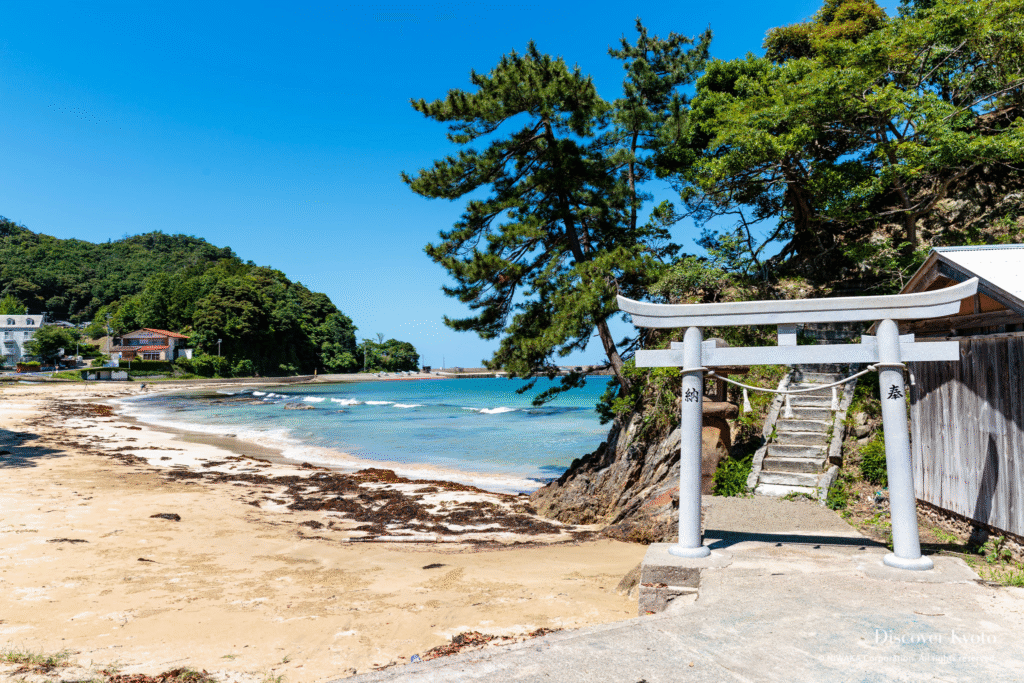
Silica grains give way underfoot while nearby pine groves infuse the salty air with forest fragrance. Camping plots lie mere steps from the surf, and crystal clear nights disclose the Milky Way overhead. Local crab feasts reward off‑season travelers.
- Travel time: 2 hour 30 minute Limited Express Hashidate from Kyoto Station
- Costs: parking ¥1,000, campsite ¥2,000
- Google maps
Amanohashidate Beach
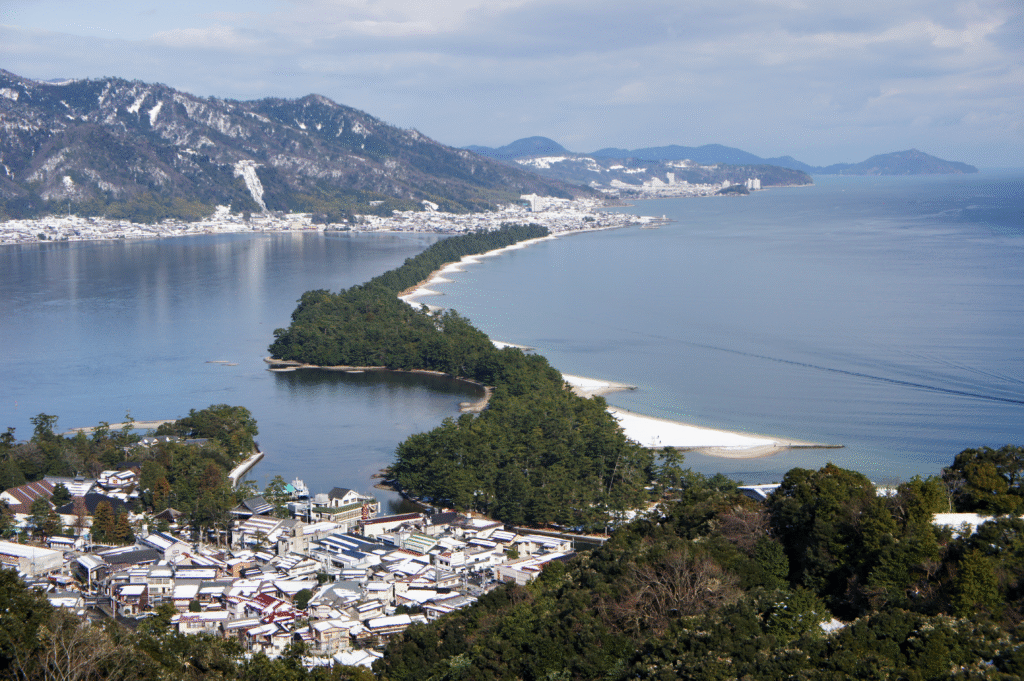
This pine‑clad sandbar linking bay shores is considered one of Japan’s most three scenic views. Lagoon‑side calm suits families, while ocean‑side waves invite body‑surfing. Bicycle rentals make crossing the spit a breezy ten‑minute ride.
- Travel time: 2 hour train from Kyoto Station
- Costs: bike ¥500, chair ¥1,000
- Google maps
Keino Matsubara, Hyogo (Awaji Island)
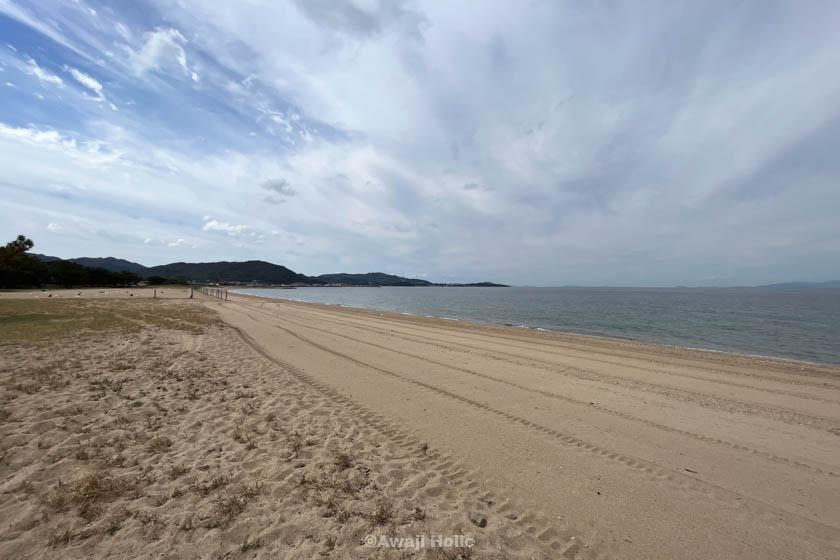
Five kilometers of white sand and black‑pine groves face sunsets over the Akashi Strait. Couples can secure swings hung between pines for golden‑hour selfies, then feast on local octopus tempura. Summer festivals float paper lanterns across the water.
- Travel time: 1 hour 40 minute bus from Kobe Station
- Costs: parking ¥700, lantern ¥600
- Google maps
Takenohama Beach, Hyogo
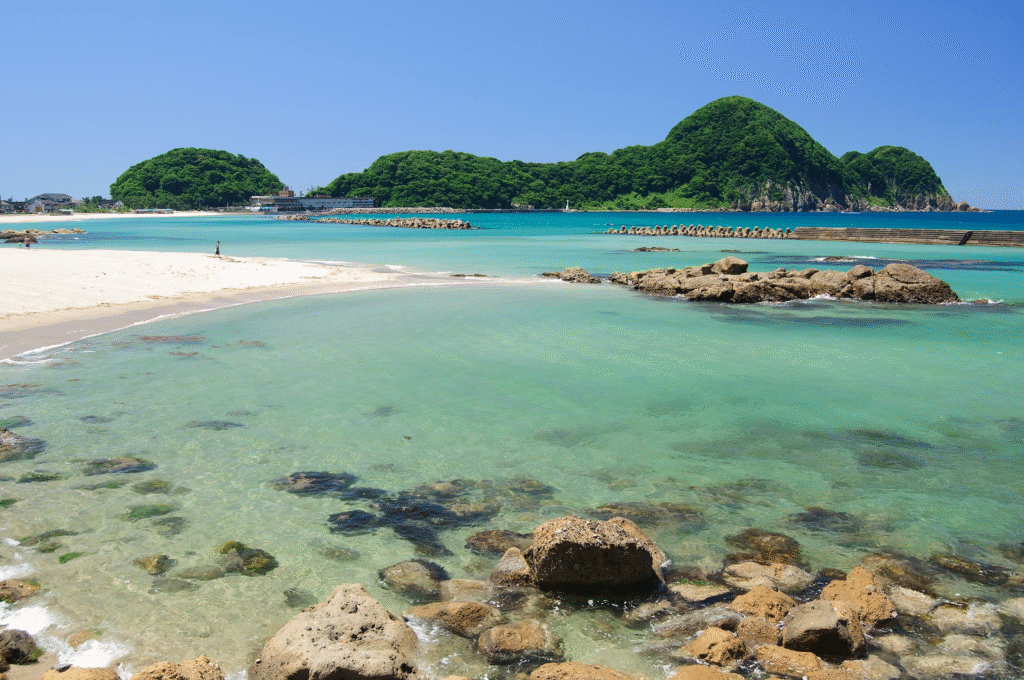
Takenohama features shallow turquoise water shallow that stretches 100 m out to sea. Stand up paddleboarding rentals launch at dawn, and neighboring cliffs hide sea caves reachable by kayak. Local minshuku inns serve Wagyu beef barbecue after your paddle.
- Travel time: 3 hour Limited Express Hamakaze train from Osaka Station and a taxi
- Costs: SUP ¥3,000/hr, kayak tour ¥5,000
- Google maps
No matter your travel style, road-tripping through wild coastlines, chasing waves on a longboard, or lounging with a beachside bento, Japan’s shores deliver more than just a summer backdrop. They offer moments of quiet awe and communal joy, of sunrise solitude and festival energy. Each region invites you to slow down, look around, and find your own rhythm beside the water. So whether it’s your first trip or your fiftieth, there’s always another stretch of sand worth discovering.



